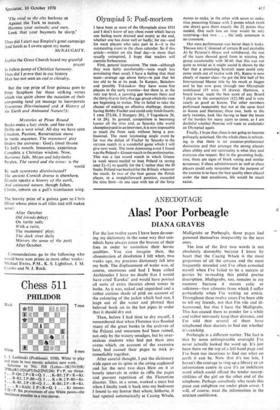Olympiad 5: Post-mortem
I have been at most of the Olympiads since 1933 and I don't know of any chess event which leaves one feeling more drained and empty at the end, whether one has done well or badly; for me—and for most players who take part in it—it is the outstanding event in the chess calendar. So if this article—written on the final day—is more than usually uninspired, I hope that readers will exercise forbearance.
. First, general impressions. The ussa—although they won fairly comfortably—were much less convincing than usual, I have a feeling that their team—average age about forty—is just that bit too old to be at its peak. In ICarpov, Balashov and possibly Tukmakov they have some fine players in the early twenties—but there is, at the very top level, a yawning gap between them and the thirty-five to forty-five age group which the USSR are beginning to notice. The us failed to take the chance of making an effective challenge, despite having Bobby Fischer and could only finish fourth: I USSR 271/44, 2 Hungary 26f, 3 Yugoslavia 26, 4 us 241. In general, competition is becoming keener all the time and, as Spassky (the world champion) said in an interview, it is now impossible to reach the front tank without being a pro- fessional. The most interesting single event by far was the defeat of Fischer by Spassky in the us/ussa match in a wonderful game which I will give next week. The most depressing event I found was the Poland v. Greece match in the preliminaries. This was a last round match in which Greece (a weak team) needed to beat Poland (a strong one) 21-11 to qualify for the C rather than the D finals; Poland was booked for the B finals whatever the result. In two of the four games the Polish player, in a straightforward position, exceeded the time limit—in one case with ten of the forty moves to make, in the other with seven to make, thus presenting Greece with 2 points which (with one draw) gave them exactly the 21 points they needed. One such loss on time would be very surprising—but two . . . the only comment is DO comment.
Our own performance was better than it looks. Thrown into C (instead of certain B and probable A) by Penrose's illness and withdrawal, the rest of the team showed good form in winning the group comfortably with 30/44; that this was not quite so trivial as it might sound is shown by the fact that a promising Scottish team could only come ninth out of twelve with 181. Keene is now clearly of master class—he got the first half of his International Master tale by his result at Siegen and he has now gone through two Olympiads undefeated (15 wins, 18 draws). Hartston, a board lower, made the best score of any Board 3 player in the competition (121/16) and is very nearly as good as Keene. The other members performed respectably but not at the same level as Keene and Hartston; these two, both in the early twenties, look like having to bear the brunt of the burden for many years to come, as I am doubtful whether Penrose will want to undertake an Olympiad again.
Finally, I hope that chess is not going to become politically polarised. On the whole chess is refresh- ing in that there is no amateur-professional distinction and that amongst the strong players chess ability and not nationality is what they and everyone else respect. But in the governing body, FIDE, there are signs of block voting and similar nonsenses; if chess administrators as well as chess players could only remember that the purpose of the exercise is to have the best quality chess played under the best conditions, life would be much easier.






































 Previous page
Previous page